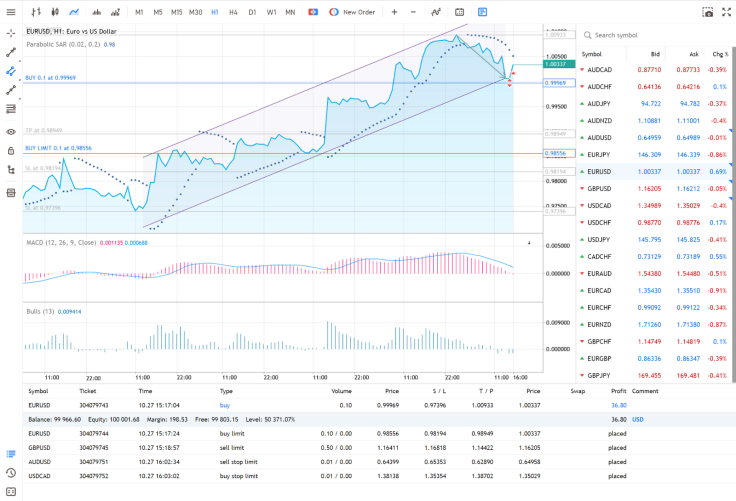The Future of Mobile Brokerage: Exploring the Benefits of Cross-Platform, Fast and Secure Software
Global equity trading amounts to over $100 trillion each year. Behind the market's rise are mobile brokerages that make it easier to buy or sell assets.

Trading is one of the biggest activities powering global economies. For example, global equity trading amounts to over $100 trillion each year. Add in other types of assets like bonds and commodities and we're talking about an unfathomable number. The market is enormous yet growing globally, and behind its rise are mobile brokerages that have made it easier to buy or sell different types of assets.
What Are Mobile Brokerages?
Mobile brokerages are platforms that let you trade assets from a mobile phone. It could be a dedicated mobile app or a website optimized for mobile usage. Gone are the days when you needed a workstation to trade assets, as you can now do that from the convenience of a smartphone in your pocket. Mobile brokerages are growing and increasingly accounting for a considerable percentage of trading volume worldwide. According to Business of Apps, mobile trading apps brought in roughly $23 billion in revenue in 2021 compared to $11 billion a year earlier and roughly $3 billion five years earlier. This statistic indicates that the demand for mobile brokerages has shot through the roof and isn't stopping anytime soon.
How Are Mobile Brokerages Making Trading Easier
Convenience And Flexibility
Mobile brokerages offer a lot of convenience and flexibility for traders. You no longer need to be near a workstation or PC to trade. Regardless of your location, you can bring out your mobile phone, launch the trading app or website, place your trades, and close it when you're done. This is very beneficial for people who trade around the clock and may be in situations where it's uncomfortable to use a PC, e.g., during a commute.
User-Friendliness
Mobile trading apps or websites optimized for mobile use usually have a simple interface that makes it easy to navigate. This happens because mobile platforms place more emphasis on visual elements than desktop platforms. Thus, you'll likely find your mobile trading platform easy to use and understand, providing a seamless way to buy and sell assets.
Efficiency
Mobile brokerages can increase your trading efficiency and effectiveness. You can place buy and sell orders within seconds on your smartphone. You can also pick up your mobile phone to monitor your portfolio and make required changes at any time. This is more efficient than using a desktop and can help you become a better trader.
Lower Transaction Fees
Mobile brokerages tend to charge lower fees than classic trading platforms built for desktops. Some of them even charge no commissions on trades but instead make money via spreads and payment-for-order-flow. Thus, mobile brokerages make it easier for the average person to become a trader.
Market Data/Reports
Mobile trading platforms can provide live market data to their users and research reports generated by reputable analysts. These reports and data help guide traders to make proper and profitable decisions and avoid trading recklessly. Users can also track live news related to a specific stock or asset base, which helps them to make decisions that match the broader market sentiment.
Advancements In Mobile Brokerages
The demand for mobile trading platforms is growing rapidly. Thus, developers are incorporating more advanced features to retain their existing customers and attract new ones. Examples of such advancements include:
Artificial Intelligence (AI)
Artificial intelligence (AI) is undoubtedly one of the most disruptive technologies of our time, and trading platforms aren't left out of the disruption. Many of them offer trading bots that use AI and machine learning to pick out what assets to buy or sell at specific times. These trading bots can be profitable for users if implemented right.
The market is all about data, and AI systems can sift through volumes of data to identify patterns. It can then make trading decisions based on the patterns it identifies, and the user can just sit back and watch the bot trade for them. This lowers the cost and barriers to entry in the trading sector because one no longer needs to spend most of their time analyzing the markets when AI can be of help.
Charting
Charts let traders monitor important data about an asset, especially its price history. They make it easy to visualize price changes in an asset over a specific period. The charts can show data from as little as a few days to several years. For example, the MetaTrader 5 Web Terminal allows users to view charts to monitor the price of assets in real-time and respond to any market changes. This platform is optimized for mobile usage and lets users open up to 100 charts at a time and even customize their appearance.

Security
Security is a paramount consideration for any platform handling money. Mobile brokerage developers recognize this and have built advanced security features to keep user data and funds secure 24/7. One example is multi-factor authentication, which requires at least two methods of identification before granting access to your account. The first is usually your email and password and the second could be a one-time code sent to the e-mail or phone number registered to your account. This way, a hacker won't be able to break into your account even if they get hold of your username and password.
Mobile trading platforms also encrypt every piece of data so that malicious actors won't be able to intercept it.
Conclusion
Mobile trading is changing the face of online trading as we know it. It's growing rapidly because of the benefits we mentioned and the advanced features being built into mobile brokerages lately, for example, artificial intelligence. This growth is mostly driven by tech-savvy, millennial investors worldwide.
Mobile brokerages have levelled the playing field such that anyone around the globe can now pick up their phone and access the features previously limited to professional traders. The mobile app market is projected to grow from $229 billion as of 2022 to $567 billion in 2030 and the mobile trading market is poised for explosive growth alongside the broader market. It remains a good time to take up mobile trading and enjoy the benefits.
© Copyright IBTimes 2025. All rights reserved.

















